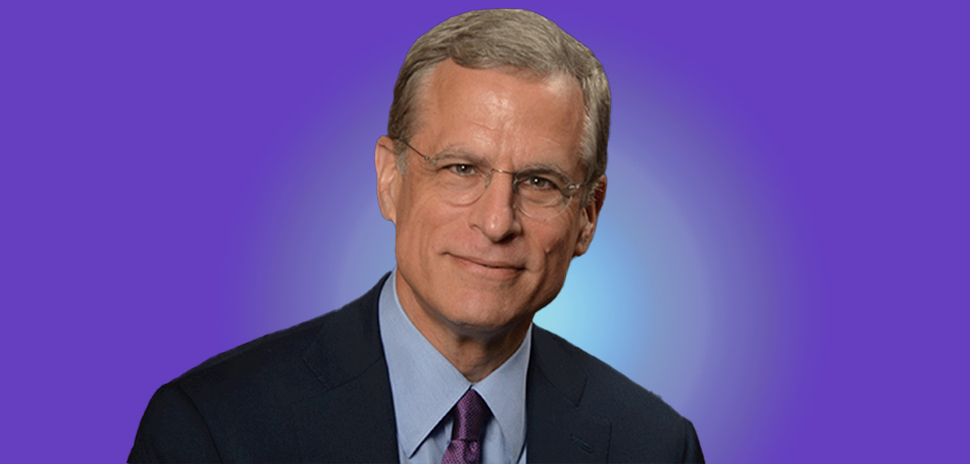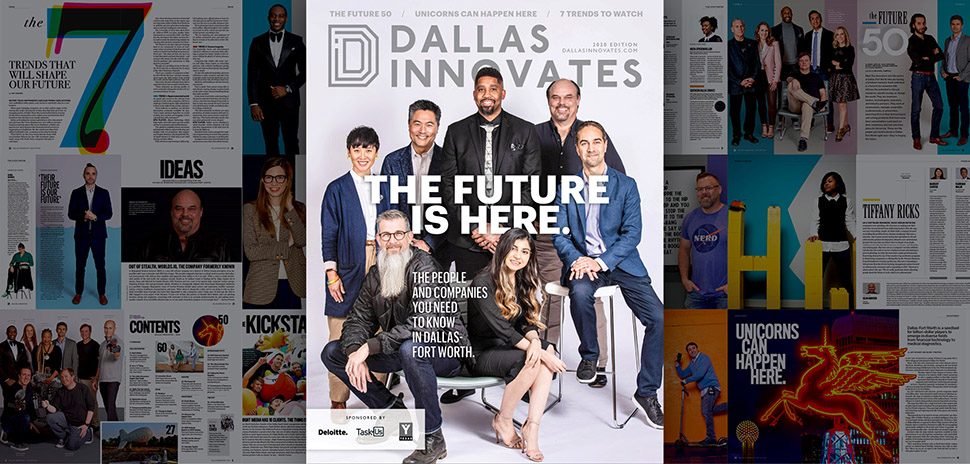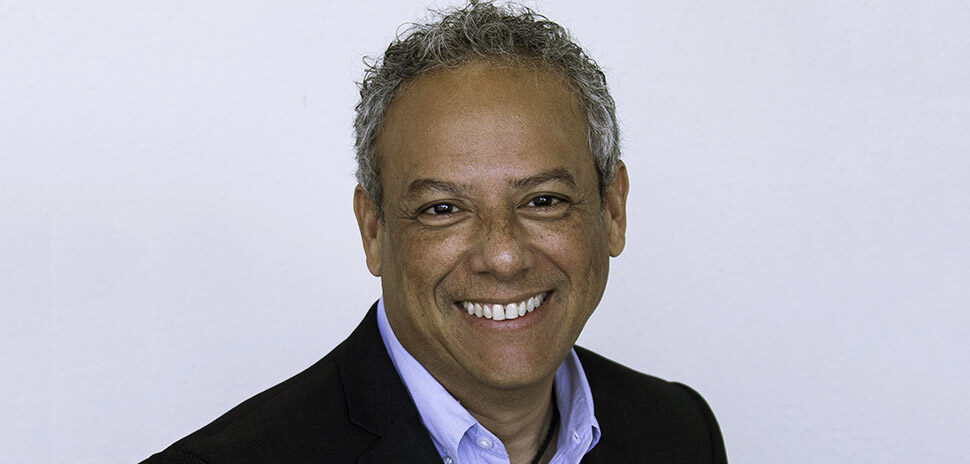Robert Kaplan, former President and CEO of the Federal Reserve Bank of Dallas, was the keynote speaker at the 11th annual Collin County Business Alliance luncheon last week. He shared his views of the current American economy and his advice on being a business leader, offering a joking lament—that alcohol wasn’t being served with lunch. Because some of his points were bracing indeed.
After his opening remarks, Kaplan sat down for a Q&A with Sanjiv Yajnik, president of financial services at Capital One. Here are edited excerpts of what Kaplan sees now, where things are headed, and what North Texas and the rest of the U.S. must do to get the economy on a stronger footing.
Local insights: Texas and Collin County are ‘bucking’ a U.S. trend
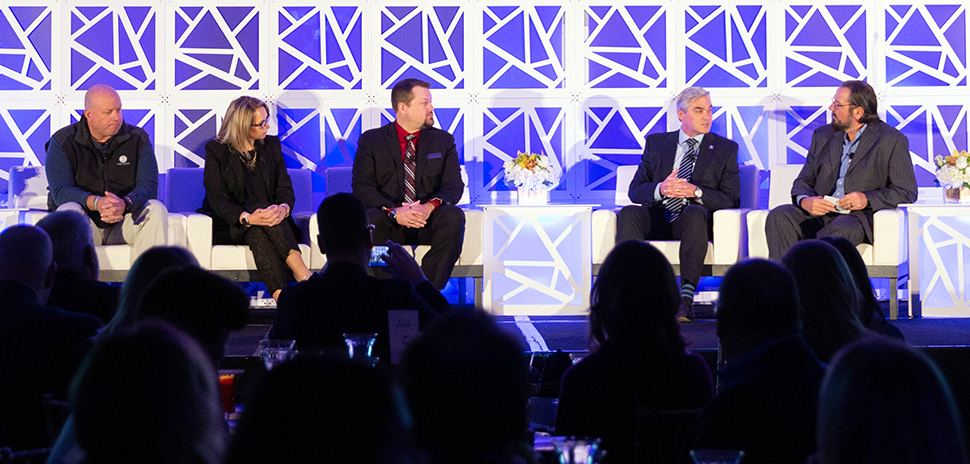
Mayors from Celina, Princeton, Prosper, and Wylie discussed the growth in Collin County in Emerging Cities at the CCBA anniversary luncheon. [Courtesy photo]
Some of Kaplan’s key local insights centered around the rapidly growing Collin County cities of Celina, Princeton, Prosper, and Wylie, whose mayors had just participated in a mayoral forum at the event.
Kaplan said the four cities “have very good workforce growth, and productivity is probably like the national average. They have unusually good growth.”
He added that Texas—and Collin County as a whole—are bucking a national trend of decelerating workforce growth.
“Even with Gen X and Gen Y coming in, the net workforce growth is pretty much flat,” Kaplan said, which is why “it’s so critical to improve early childhood literacy,” as well as the digital divide, skills training, and the secondary education system. “And yes, even legal immigration is a very important topic that we may have to get back to someday, because we need workforce growth.”
The keys to a ‘successful city’ going forward
“What’s the key characteristic of a successful city going forward?” Kaplan said. “The ability to have good early childhood literacy. Wi-Fi. Skills training. Good junior colleges. And keeping people so they can stay in the workforce, and retrain and be adaptable. That’s what a great city of the future will look like.”
Taking the wider U.S. view, Kaplan explored two hot topics: where U.S. GDP growth is headed, and how inflation is impacting the economy and businesses nationwide.
‘Keep your eye on nominal GDP growth’
Kaplan noted that in 2019—”way back in the Stone Age”—inflation-adjusted U.S. GDP growth on a real basis was about 1.75%. “Nominal growth, real growth plus inflation, was 3.5%.
“We were doing well,” he said, “But a lot of people were very disappointed the growth was only 1.75%.”
“If you’re going to grow nominal GDP faster than 3.5% to 4%, the excess is going to be inflation. You just have to accept that,” he added.
On inflation—and who it’s hurting most
Why has inflation spiked so high this year? “We really overheated the economy,” he said, pointing to continued stimulus efforts in 2021 after COVID vaccines were already out. “The Fed kept buying bonds, and in effect, printing the money.”
“What was nominal growth in 2021? 12%. It was the highest growth we’d had in decades, which feels good while you’re going through it. But it creates a lot of inflation pressures. You got shortages of things, including of workers.”
“For all the concern about whether we’re in a recession, nominal growth, right now, for this year is probably going to be 9%.”
Kaplan said there are “50 million families in this country that basically make $50,000 a year,” and they’re being hurt most by inflation—because they haven’t gotten a lot of government help, and they’re finding it hard to make ends meet.
“If inflation for all of us is 5%, for them it might be 10%, because rents have gone up and they don’t even have savings,” Kaplan said. “They don’t own their homes. They have to drive a car to get to work.”
Kaplan’s bottom line on inflation: “Keep your eye on nominal GDP growth. It never gets reported. It’s got to get down, I believe, to about 4% again, if we’re going to get inflation down to 2 percent.”
His advice to business people managing the current market
“You’re all aware of the rate increases,” Kaplan said. “My only advice to business people I talk to every day: Don’t forget about the balance sheet run-off. There’ll be less liquidity, which means if you’re a very high-quality business, I think you’ll still have good access to capital. If you’re a more marginal quality, and there’s more risk in lending to you, I think risk premiums are going to gap out a bit more next year. And so, don’t get yourself over-extended, over-leveraged, if you can avoid it.”
What you miss when you watch the ‘bouncing balls’ on CNBC
Kaplan said many people spend too much time following the “bouncing balls” of stocks and data points on CNBC and other business news services. Instead, he said, they should pay attention to the five biggest structural drivers of the economy:
“Number one, watch what’s going on with demographics,” he said. “The most developed countries have the same demographic problem we do. Japan has it worse. Germany’s population is actually shrinking. China’s got a terrible demographic problem, that they mask it with a lot of investment.”
“Number two: globalization has been a disinflationary force for a long time. If you couldn’t do things here, you might have outsourced certain jobs or processes. We’re now in the period because of strained relations with China, the Ukraine-Russia war, COVID made us think about the fact that maybe we need to be onshoring and having things more ready. And so, we’re in a process of deglobalizing. Deglobalization is inflationary. It costs more, but we’re willing to do it. It’s not the disinflationary force we had. So, watch that.”
“The third force: technology-enabled disruption, which isn’t new. Technology replacing people is accelerating. It’s a disinflationary force, but what it means is literacy matters more. Workforce retraining matters more. That’s why any investments we can make in [Dallas’] Paul Quinn College, early childhood literacy, digital divide, workforce training, are worth their weight in gold. I wished as a country we talked about them more. They’re critical.”
“The fourth issue is the energy transition. A lot of the inflation we’re seeing around the world is because we’re moving from fossil fuels to alternatives. The only little boo-boo is it’s a 40-year transition, and we’re talking about it like it’s a five-year transition. We’re going to rid ourselves of fossil fuels. The problem is there aren’t nearly enough wind and solar alternatives available—even nuclear—to bridge the gap. So you’re seeing price spikes all over the world. It’s created a crisis in Europe, it’s creating a lot of strains here. It’s hurting that $50,000-a-year family.”
“And the fifth driver is we’re at the end of the debt super-cycle. In the past, you’d say, ‘Well, we’ll just use government spending and we’ll print more money.'” That won’t be the answer moving forward, Kaplan suggested. “We’re going to have to get back to the old-fashioned way of investments in things to grow the workforce and improve productivity. But financial gimmickry from the government? Please! They don’t have the dry powder to do it. We’ve used it excessively.”
Capital One’s Sanjiv Yajnik breaks the ice
With that, Capital One’s Sanjiv Yajnik broke the ice by saying, “Can we get the alcohol to every table, please?” Then he asked more about the Fed’s moves in recent years, and moving forward.
“In 2021, I would argue the Fed would have been better off taking the foot off the accelerator,” Kaplan said. “For most who watch my speeches, I was arguing all year, let’s take our foot off the accelerator because, otherwise, you have to slam on the brakes. And right now, we’re in the process of slamming on the brakes.”
Government spending and Fed moves: Like ‘driving your car at 120 miles an hour’
“A lot of government spending plus printing [money] and keeping rates to zero is equivalent to driving your car at 120 miles an hour,” Kaplan said. “Which can be fun, except if there’s a red light down the road. Because you can so overheat demand where you don’t have enough supply, including of workers.”
“We’ve assumed that government spending is free. And it’s an issue with college: ‘Let’s forgive $500 billion of student debt.’ But there’s a cost to it. It increases demand. And again, it makes it harder for the $50,000-a-year family to make ends meet. And by the way, many of them didn’t get any benefit from that $500 billion relief.”
Education is ‘the No. 1 issue with our country’
Yajnik noted that the biggest takeaways for Collin County seemed to be finding ways to “increase our basic potential of productivity, infrastructure productivity, and attract workers.”
“And I’ll give a third,” Kaplan responded. “[Making] it easier for women to work. That means affordable childcare and access to it. And [making] it easier for people to work longer in their careers, which means transitioning from a physical job to something you can do remotely. Getting the most out of our population in terms of being in the workforce can matter a lot.”
A key force to build that workforce? Education.
“Education is the No. 1 issue with our country right now,” Kaplan said.
The role of the arts
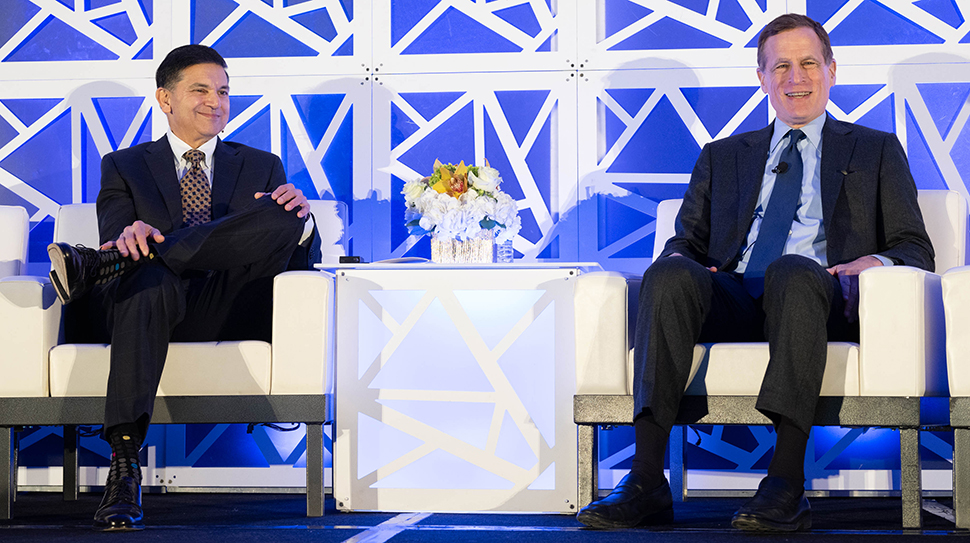
Capital One’s Sanjiv Yajnik and former Dallas Fed President and CEO Robert Kaplan on stage at the Collin County Business Alliance luncheon. [Photo:Grant Miller Photography]
“The arts are so important to a city and a region,” Yajnik said, asking how the arts can connect to the economy.
“The symphony is a good example,” Kaplan replied. “Some of the arts are viewed as elitist by the population. A lot of what the arts are doing around the country is going into at-risk communities. And either teaching an instrument, teaching teachers how to teach an instrument, familiarizing students with art, including painting, drawing, other things, which I think all the studies show, helps their educational development.”
Another thing that helps communities? Libraries.
“People don’t think about the library much, but it’s critical in the community, particularly in literacy for at-risk populations,” Kaplan said.
Advice to college students
Addressing college students, Kaplan said, “You’re going into a buyer’s market, with you being the buyer. There’s going to be a shortage of workers. I think for the foreseeable future, you’re going to have lots of options. If you’re literate, you get your education, you’re dependable, you show up to work every day, you’re reliable – I think you’re going to have lots of options. So, my main advice to you is to figure out what your strengths and weaknesses are and what your passions are. Where do you shine, what kinds of skills? I think you’re going to have a lot of choices.”
“And TikTok celebrity is not a viable career strategy,” Yajnik chimed in for college students who may be dreaming of it. He added that it may be good for the time being, but asked, “How does it improve productivity again?”
Advice to business leaders
Kaplan is the author of three books—”What You Really Need to Lead: The Power of Thinking and Acting Like an Owner”; “What You’re Really Meant To Do: A Road Map for Reaching Your Unique Potential”; and “What to Ask the Person in the Mirror: Critical Questions for Becoming a More Effective Leader and Reaching Your Potential.”
So he’s already given business leaders a lot of advice. His biggest message at the CCBA luncheon?
“Leadership is about asking the right questions, it’s not about having all the answers,” Kaplan said. “It’s about learning. As long as you’re willing to keep learning, you’ve got a hell of a good chance to be a sustainable leader for a long time. Ask questions, seek advice. Go with a yellow pad and interview people. Find out what their needs are, what’s their advice. People will feel empowered by leaders that do that.”
![]()
Get on the list.
Dallas Innovates, every day.
Sign up to keep your eye on what’s new and next in Dallas-Fort Worth, every day.










